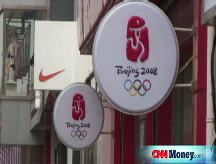Chinese banks eye American soil
ICBC - the largest lender in China - is the latest to win approval to do wholesale banking stateside. Others may follow.
 |
| Pedestrians walk past an Industrial and Commercial Bank of China (ICBC) branch in Beijing, China. |
NEW YORK (CNNMoney.com) -- The American banking system has become a melting pot in recent years as financial institutions from all over the world have set up shop in the United States.
Now more Chinese banks, bolstered by a booming economy and recently forged alliances with big Western players, are eyeing a stateside presence.
Earlier this month, the Federal Reserve gave the go-ahead to Industrial and Commercial Bank of China, China's largest lender, to open a wholesale banking operation in New York - a sign that some experts say could herald a wave of other Chinese banks entering the United States.
"This is an acknowledgement that they are on the way," said Henry Fields, a partner at the law firm Morrison & Foerster whose practice has centered around assisting foreign banks looking to establish operations in the United States.
China's ICBC is hardly the first foreign financial institution to put down roots in the United States. This year alone, a number of banks from such far-flung countries as Azerbaijan and India were approved by the Fed to establish representative branches here in the United States.
ICBC is the second Chinese bank to set up shop in the United States over the past year. China Merchants Bank won similar approval from the Fed in November. Currently, only a handful of Chinese banks are chartered domestically.
Under the Fed authorization, ICBC will be able to finance trade and support the increasing number of its clients doing business in the United States.
ICBC will not be able to take in FDIC-insured deposits, but the start of a commercial branch is often considered to be the first step for a foreign bank looking to expand into the United States.
"Foreign banks have traditionally come through wholesale branches and then the banks usually expand into retail banking if there is a strategic reason to do so," said Fields.
Indeed, Chinese banks are enjoying a period of robust growth. Last year, the country's four largest financial institutions experienced a surge in loan growth, reporting double-digit percentage profit increases or better. Combined, ICBC and China Construction Bank collected close to $20 billion in profits in 2007, based on the latest figures compiled for the Global Fortune 500.
That's a sharp contrast to a decade ago when many of those same banks lost money at an alarming rate after after doling out funds to poorly-run government businesses only to find themselves on the hook for those same troubled loans.
Given that growth, Chinese banks would seem to be ideal candidates to expand overseas - except for the fact that many of these financial institutions are still quite unsophisticated.
Currently, most of their investments are financed through retained profits, and their lending, credit card and risk management practices remain largely outdated, notes Edmund Harriss, a London-based investment director for Guinness Atkinson who helps run three Asia Pacific-focused funds.
"Chinese banks are really still learning how to run a fully commercial operation," said Harriss.
Hoping to catch up with the rest of the financial services world, a number of China's biggest banks have sold stakes or partnered with some of the top global financial firms, including HSBC (HBC), Goldman Sachs (GS, Fortune 500), Citigroup (C, Fortune 500), Bank of America (BAC, Fortune 500) and Merrill Lynch (MER, Fortune 500).
Until then, banks in China are looking inward for growth.
With the industry experiencing further government deregulation and rapid domestic growth, more Chinese banks are teaming up to build out their branch networks domestically, notes Richard Gao, the lead portfolio manager of the Matthews China Fund, which has about $1.4 billion of assets under management and invests primarily in companies located in China.
"Right now they see that the home market is rapidly growing," said Gao.
While Chinese banks from are making the necessary moves to enter the U.S. market, most experts believe it will be several years before one opens a branch on Main Street or becomes a Wall Street player.
A representative at ICBC's offices in New York declined to comment on whether the company had plans to expand further within the United States.
Breaking out into the U.S. retail banking market, for instance, would require buying a U.S. bank or establishing their own branch network - both of which would require further approval from top U.S. banking regulators, including the Federal Reserve.
And certainly a greater stateside presence by a Chinese bank would raise eyebrows among lawmakers in Washington.
The Chinese state-run oil company, China National Offshore Oil Corp., or Cnooc, sparked a storm of controversy in 2005 when it made a bid for the U.S. oil and gas producer Unocal Corp. Cnooc ultimately dropped its bid in the face of congressional opposition.
Having learned from this experience, Chinese financial institutions, many of which are still majority owned by the China's government, will exercise plenty of caution in the face of those U.S. protectionist fears, notes Fields.
"There is a lot of xenophobia about China," he said. "They [Chinese banks] have to be careful about their profile politically in the U.S." ![]()



